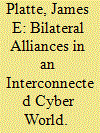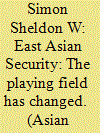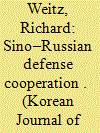| Srl | Item |
| 1 |
ID:
190074


|
|
|
|
|
| Summary/Abstract |
During the Cold War, US extended deterrence commitments mostly focused on deterring nuclear or strategic conventional attacks against allies in Europe and Asia. In the decades following the end of the Cold War in the early 1990s, the emergence of new technologies and domains for conflict, particularly the cyber domain, prompted new thinking for alliance management and extended deterrence. In this article I explore how the system of US bilateral alliances and informal strategic groupings in the Indo-Pacific affects the crafting of allied cyber deterrence strategies in the region. Based on deterrence and alliance theory, I survey cyber threats faced by US allies and partners in the region and views of cyber deterrence to form a general framework of allied cyber deterrence strategy. The US-South Korea alliance is used as a case study for allied cyber deterrence strategy, with a special focus on the impact that South Korea assuming wartime operational control of allied military forces could have on cyber deterrence on the Korean Peninsula. Just as concepts of extended deterrence had to evolve, the cyber domain will force the United States and allies to reconceptualize peacetime and wartime operational control.
|
|
|
|
|
|
|
|
|
|
|
|
|
|
|
|
| 2 |
ID:
008688


|
|
|
|
|
| Publication |
Dec 1994.
|
| Description |
1047-1063
|
|
|
|
|
|
|
|
|
|
|
|
|
|
|
|
| 3 |
ID:
157757


|
|
|
|
|
| Summary/Abstract |
The strengthening Sino–Russian defense partnership has complicated ROK–U.S.
military planning regarding North Korea, diverted U.S. and Japanese resources from
concentrating against North Korea, and worsened the regional security environment
by stimulating local arms races. Beijing and Moscow’s vigorous opposition to the
deployment of advanced U.S. missile defenses in South Korea has illuminated
their perception of increased ROK–U.S. military ties as a potential threat. Further,
China and Russia’s military activities around the Korean Peninsula increase the risk
of inadvertent encounters with other navies. South Korea, Japan, and the United
States need to consider how China and Russia will react in such cases. Additionally,
because the expanding Sino–Russian defense cooperation and technology sharing
complicates assessments of military developments and security trends in Asia, it is
imperative to hold expanded ROK–U.S. consultations, about Sino–Russian defense
interactions, ideally with the inclusion of Japan.
|
|
|
|
|
|
|
|
|
|
|
|
|
|
|
|